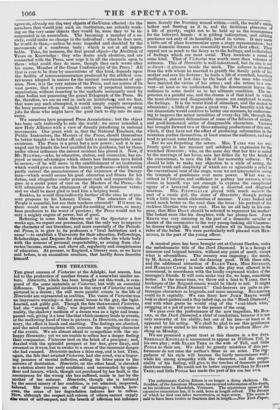THE THEATRES.
THE great success of Victorine at the Adelphi, last season, has led to the production of another drama of a somewhat similar na- ture. Henriette, which has been brought out this week, is com- posed of the same materials as Victorine, but with an essential difference. The painful incidents in the story of Victorine are but pictured in a dream ; the still more painful events in the life of Henriette are represented as realities. The vision of Victorine was in impressive warning—a fine moral lesson to the gay, the light- hearted, and giddy girl. Though the fate that awaited Victorine, bad she "stooped to folly," was depicted with the vividness of reality, the shadowy medium of a dream was as a light and trans- parent veil, giving it a tone like that which memory lends to events, or the mellowing hand of time to pictures. In Henriette, on the con- trary, the effect is harsh and startling. The feelings are shocked, and the mind contemplates with aversion the repelling character of the events. We are almost afraid to sympathize with the un- happy Henriette; yet we are unable to refuse her a deeper feeling than compassion. Victorine trod on the brink of a precipice; and, dazzled with the splendid prospect at her feet, grew dizzy, and swooned as it were,but to awake to a sense of the imminent danger she had escaped. Henriette makes a false step, and is lost. Then, again, the fate that awaited Victorine, had she erred, was a linger- ing penance of mental infliction, adding its bitter pains to the sorrows of destitution. Henriette, on the other hand, is elevated to a station above her early condition; and surrounded by splen- dour and luxury, which, though not purchased by her fault, is the recompense for the wrong she has suffered, made to her by the mother of her seducer. Henriette, though she is tortured by the secret misery of her condition, is yet admired, respected, beloved. She receives an offer of marriage ; which, how- ever, the sense of her degradation induces her to refuse. Now, although the respect and esteem of others cannot supply the want of self-respect, and the breath of affection but inflames more fiercely the .biarning wound within,—still, the world's smile, hollow and fleetmg as it is, and the factitious pleasures of a life of gayety, ought not to be held up as the recompenses for the betrayed female : it is gilding indiscretion,' and robbing penitence not only of its humility, but of its virtue. It may seem a little out of place to sermonize upon a stage representation; but these domestic dramas are essentially moral in their effect. They appeal not so much to the fancy as to the feelings, and to that class of feelings which are most social. They inculcate a moral of some kind. That of Victorine was worth more than volumes of sermons. This of Henriette is well-intentioned, but its aim is not so direct—it glances beside the mark. The seducer is divorced from the wife whom he married to gratify the family pride of his mother and save his fortune; he leads a life of wretched, heartless profligacy, and at last dies by the hand of the man who would have married the victim of his crime ; and she retires to a con- vent—at least so we understood, for the. denouement leaves the audience in some doubt as to her ultimate condition. The im- pression is a painful one, and the drama is of that kind in which the most obvious and disagreeable means are employed to excite the feelings. It is the worst kind of stimulant, and the easiest to administer ; a little of it goes a great way. We heartily wish that our dramatists would contrive to better our manners,by endeavour- ing to improve the minor moralities of every-day life, through the medium of pleasant delineations of some of the fallacies of society, and good-humoured satire of disagreeable characters. VESTRIS has brought forward two or three amusing productions of this sort, which, if they have not the effect of producing reformation in the mistaken parties themselves, at least amuse the audience, and may tend to prevent some future evils.
But we are forgetting the actors. Mrs.. YATES was too uni- formly quiet in her manner and subdued in expression for the wretched Henriette ; who, on the same day that her fate is sealed by the marriage of her lover, sees her father die by the hands of the executioner, to save the life of her unworthy seducer. We should be loth to make any objection to a style of acting, the general truth and simplicity of which are so agreeable a relief to the conventional rant of the stage, were we not interested in seeing the triumph of gentleness over mere power. What was ex- cellent in Victorine, and sufficient to portray her sorrows, which centre in herself, was not enough to express the complicated agony of a bereaved daughter and a deserted and disgraced mistress. Mrs. FITZWILLIAM played with much naïveté the part of a rustic girl, the sister of Henriette; though perhaps with a little too much elaboration of manner. YATES looked and acted much better as the roue than the lover: his portrait of the reckless libertine was very real. Has he no old lady in his com- pany, that Miss DALY should be selected to represent his mother? She looked more like his daughter, with her plump face. JOHN REEVE was very amusing in the part of a domestic cavalier or master of the ceremonies to the very young-looking old Countess: he dances through life, and would reduce all its business to the rules of the ballet. We were particularly well pleased with HEM- MINGS, in the part of the young officer.


























 Previous page
Previous page